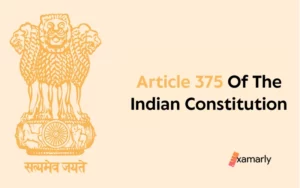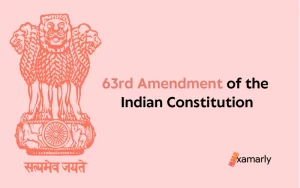International Relations (IR) is a subject that deals with countries, political systems, borders, etc. Most of the UPSC aspirants ponder how to prepare International Relations for UPSC and they seek guidance to ace their UPSC preparation for this subject.
A lot of students look at International Relations as a boring subject but if you are about to appear for your Union Public Service Commission (UPSC) Civil Services Examination (CSE), it’s high time you start taking interest in it.
In your civil services exam papers, there will be a section on International Relations. So here’s a blog that will guide you on how to prepare for International Relations for the UPSC exam with ease.
- International Relations for UPSC Exam
- Advantages of International Relations Subject in UPSC
- UPSC CSE Syllabus for International Relations (IR)
- Topic-Wise Syllabus of International Relations for IAS Mains
- Trend Analysis of UPSC CSE International Relations
- International Relations Booklist for UPSC
- Tips on How to Prepare International Relations for UPSC Mains
- 1. Mind-Mapping the UPSC Syllabus (3R Technique)
- 2. Make Concise Notes
- 3. Revise to Retain
- 4. Practice Answer Writing to Understand More
- 5. Solve Previous Year's Question Papers
- International Relations Preparation Strategy
- Conclusion
- FAQs related to How to Prepare International Relations for UPSC Exam
- What is the best approach to preparing for International Relations for the UPSC examination?
- How much time should I dedicate to preparing for International Relations for UPSC?
- What are the most important topics in International Relations for UPSC?
- Which books should I refer to for preparing International Relations for UPSC?
- Is it necessary to have prior knowledge of International Relations to prepare for UPSC?
- How much weightage is given to International Relations in UPSC exams?
- Are there any specific sources for preparing current affairs related to International Relations for UPSC?
- How much importance should be given to mock tests while preparing for International Relations for UPSC?
- Can online sources like YouTube videos and online notes be used to prepare for International Relations for UPSC?
International Relations for UPSC Exam
International Relations is an important topic from the UPSC CSE point of view. It includes foreign policies of states, their relations with each other, with international organizations, their foreign trade practices, issues of environmental security, international cooperation, dispute settlement mechanisms, economic sanctions, the increasing role of NGOs, the role of international courts, etc.
It is a current affairs-based topic and standard questions are asked mainly in General studies paper-2 worth 50-80 marks. Being a current affairs-based subject it is of high importance for UPSC civil services examination.
International relations is a segment of GS paper-2, as the whole paper is based on Polity and Governance. You need to have a strong command of this subject as the questions are also asked in the Prelims section in the form of current affairs and it is very important to understand the current events of national and international importance.
Advantages of International Relations Subject in UPSC
- Relevance: International Relations holds significant weightage in the UPSC exams and is an essential part of the syllabus, providing an insight into the global political scenario.
- Current Affairs: It is an important aspect of current affairs and helps keep up to date with the latest developments in the world.
- Knowledge Base: Studying International Relations broadens one’s knowledge base and helps in understanding the complexities of global politics.
- Career Opportunities: A good score in this subject can open up opportunities for a career in diplomacy, international organizations, and government agencies dealing with foreign affairs.
- Career Advancement: Knowledge of International Relations is an important skill for individuals working in government or multinational organizations, helping them in their career advancement.
- Personal Development: Studying IR fosters critical thinking and enhances analytical skills, leading to personal development.
- Understanding of the World: It helps in understanding the interdependence and interconnectedness of nations and the impact of global events on one’s own country.
- Improving Communication Skills: International Relations require strong verbal and written communication skills, and preparing for the UPSC exam in this subject can help in improving them.
- Preparation for Civil Services: Preparing for International Relations as part of UPSC exams also helps in preparing for other Civil Services exams where the subject holds significant weightage.
UPSC CSE Syllabus for International Relations (IR)
- India and its neighbourhood relations.
- Organizations and treaties at the bilateral, regional, and global levels that India is part of or that might have an impact on its interests.
- Effect of policies and politics of developed and developing countries on India’s interests, Indian diaspora, and recent development over the world in context with India.
- A look at the organisation and responsibilities of key international organisations and agencies.
Topic-Wise Syllabus of International Relations for IAS Mains
Topic-wise syllabus of International relations for UPSC Mains is presented in a tabular form below:
| India & Neighbouring Countries | India – Nepal Relations India and Bhutan Indo-Afghan Bilateral Relations India-Bangladesh Relations India-Maldives Relations India-Sri Lanka Relations India-Myanmar Relations Indo-Pak Relations Indo-China Relations South China Sea Dispute Security Challenges in the Indian Ocean Region |
| India & Asian Nation Relations | CIS Countries of Central Asia India-Mongolia India – UAE Relations India – IRAN India – ISRAEL India – Saudi Arabia Asia-Pacific Region India-South East Asia Indo-Japan Bilateral Relationship India – South Korea India-Vietnam |
| India & Other Nations & Organizations | India and Africa Indo-Australia Relationship Indo-France Indo-Germany Indo-UK India-USA Relations The World Trade Organization International Monetary Fund Nuclear Security Summit BRICS BIMSTEC IBSA SAARC Relevance of Non-Alignment in present India India-ASEAN Economic Cooperation |
Trend Analysis of UPSC CSE International Relations
The weightage of questions asked from International Relations in the various years in UPSC Mains are as follows:
| Year | Weightage of questions in UPSC |
|---|---|
| 2018 | 80 marks |
| 2019 | 75 marks |
| 2020 | 55 marks |
Questions from non-neighbouring nations and various International organizations are asked every year.
In 2018, questions worth 25 marks were asked from the section on non-neighbours, and 40 marks were awarded for questions from the section on International organizations.
Next year in 2019, 50 marks were awarded for both sections.
International Relations Booklist for UPSC
There are some prescribed books also available in the market that will definitely help you in solving the Prelims part and the static part for Mains answer writing. However, to prepare for the dynamic part, you have to research a lot.
Booklists to cover International Relations for the UPSC Exam are given below, which will help you to complete your UPSC IAS preparation for this subject:
Prelims
- NCERT XII (Contemporary World Politics)
- Current Affairs (News Analysis)
Mains
- India’s Foreign Policy Since Independence by V.P. Dutt
- Pax Indica by Shashi Tharoor
- Challenge and Strategy: Rethinking India’s Foreign Policy – Rajeev Sikri
- India’s Foreign Policy: Coping with the Changing World – Muchkund Dubey
- International Relations: Pushpesh Pant
Tips on How to Prepare International Relations for UPSC Mains
International Relations is a section that is a mixture of both static and dynamic questions. However, most of the questions asked on this subject are based on current affairs and various political scenarios. Around 50-80 marks questions are asked every year.
You will look into this trend in the further section. It is very important to keep track of the current International developments, current affairs, trends, issues, and how various International events are affecting India.
Here are 5 methods discussed below that will help you to understand how to prepare International relations for UPSC with ease:
1. Mind-Mapping the UPSC Syllabus (3R Technique)
It is very important for an aspirant to follow the 3R technique to build a proper mind map so that it will be easy for them to move on the right path.
3R technique stands for Read, Recognize and React.
Reading and understanding the whole UPSC CSE syllabus is of utmost importance for an aspirant while appearing for Civil Services Exam. It gives you the core idea and intention of the dynamic topic.
After that, recognizing the similar topics which come both in Prelims and UPSC Mains Exams, complex areas, easy areas and the areas which are favourite of UPSC should be done judiciously.
Recognizing and understanding the structure will lead you to take the next step, i.e., Reacting or taking a step in something that will cover your entire syllabus ultimately. Without any action, there is no use in reading and recognizing the stuff.
2. Make Concise Notes
Unlike other subjects, there is no particular book to prepare for International Relations. You can find books based on the topic but the real problem is that a lot of questions asked in the exam are from the dynamic area.
Dynamic area means that questions are not direct but come from the current affairs section. Therefore, referring to different sorts of books, newspapers, editorials, current affairs magazines, and websites of External Affairs is the only solution.
You need to make concise notes while studying for this paper. The UPSC syllabus as a whole is vast but you will not be able to cover everything during your preparation. So, it is essential that you make concise notes about the topics that you have studied thoroughly.
This will help you remember important concepts easily during the exam and also enable you to answer questions quickly without having to refer back to books or notes too often.
3. Revise to Retain
It is a fact that UPSC CSE Syllabus is quite vast. Retaining everything is not possible. What is possible is a proper and dedicated revision. Remembering a lot of country matters and diplomatic decisions is not an amateur’s job.
You have to upgrade yourself day by day. Revision is the only way to do this. Keep revising your own short and large notes to retain every possible information that is necessary for Mains answer writing.
4. Practice Answer Writing to Understand More
Mains answer writing needs practice as it demands an opinionated answer from the aspirant. Your answer must contain facts along with your personal opinions on the matter without being emotional.
Opinions reflect your understanding of the matter and the more you understand, the more you become a deserving candidate. To sharpen your opinions and your answer writing skills it is very important to practice more and more.
5. Solve Previous Year’s Question Papers
The most important part is to prepare yourself for the expected questions. The only way to do this is by solving the previous year’s questions.
Previous year’s question papers of the Civil Services Exam not just prepare you for the expected but for the unexpected also. It shows you the type of questions asked, the most favoured topics and the trend UPSC follows while asking questions.
Related Reading: 11 Effortless Tips on How to read “The Hindu” for UPSC
International Relations Preparation Strategy
Strategy for Paper 1 (Preliminary Exam):
- Syllabus: Familiarize yourself with the UPSC syllabus for International Relations and allocate adequate time to each topic.
- NCERT Books: Start with NCERT textbooks for political science and International Relations to build a solid foundation.
- Current Affairs: Follow current events related to International Relations and make a habit of reading newspapers, news portals, and watching news channels.
- Reference Books: Read books like India’s Foreign Policy by Rajiv Sikri and International Relations by Pavneet Singh to get a comprehensive understanding of the subject.
- Practice: Solve previous year’s question papers and practice writing answers to improve your speed and writing skills.
- Online Resources: Use the internet wisely and utilize online resources such as YouTube videos, online notes, and forums for supplementary study material.
Strategy for Paper 2 (Mains Exam):
- Writing Skills: Focus on improving your writing skills and work on structuring your answers well, including facts, analysis, and opinions.
- Case Studies: Study case studies and be prepared to analyze and discuss specific events related to International Relations.
- Current Affairs: Keep yourself updated with current events and their impact on International Relations.
- Map Work: Brush up your map work skills as it holds significant weightage in the Mains exam.
- Essay Writing: Practice writing essays on topics related to International Relations to get a better understanding of the subject.
- Group Discussion: Participate in group discussions to develop your communication and analytical skills.
- Mock Tests: Take mock tests to assess your progress and identify areas for improvement.
Remember, consistency, self-assessment, dedication and staying motivated are key to success in the UPSC exam. By following the above-mentioned strategy, you can prepare effectively for the International Relations paper in the UPSC exam.
You Might Also Like: Time Management for UPSC Preparation: 9 Effective Tips
Conclusion
In conclusion, preparing for International Relations for the UPSC exam requires a holistic approach that combines self-study, classroom coaching, mock tests, and current affairs. It is important to follow the recommended syllabus and study material, dedicating enough time and effort to the subject.
Regular practice and mock tests will help assess your progress and identify areas for improvement. With dedication, hard work, and the right approach, one can successfully prepare for International Relations and achieve their goal of cracking the UPSC exam.
FAQs related to How to Prepare International Relations for UPSC Exam
What is the best approach to preparing for International Relations for the UPSC examination?
A comprehensive approach combining self-study, classroom coaching, and mock tests is recommended.
How much time should I dedicate to preparing for International Relations for UPSC?
The amount of time required depends on an individual’s background and pace of learning, but at least 6-8 months of dedicated preparation is advised.
What are the most important topics in International Relations for UPSC?
Key topics include global politics, world economic systems, international organizations, and current affairs.
Which books should I refer to for preparing International Relations for UPSC?
NCERT books for Political Science and International Relations, India’s Foreign Policy by Rajiv Sikri, and International Relations by Pavneet Singh are some of the recommended books.
Is it necessary to have prior knowledge of International Relations to prepare for UPSC?
Prior knowledge may help but is not necessary as the syllabus is comprehensive and covers all relevant topics.
How much weightage is given to International Relations in UPSC exams?
International relations hold a significant weightage in both the Preliminary and Mains exam of UPSC.
Are there any specific sources for preparing current affairs related to International Relations for UPSC?
Reading newspapers like The Hindu, and The Indian Express and following news portals like NDTV, The Times of India, etc. can be helpful in preparing current affairs.
How much importance should be given to mock tests while preparing for International Relations for UPSC?
Regular mock tests are an important aspect of preparation as they provide an idea of the exam pattern and help identify areas for improvement.
Can online sources like YouTube videos and online notes be used to prepare for International Relations for UPSC?
Online sources can be used as supplementary material but it’s important to rely on authentic and recommended books and study materials.






